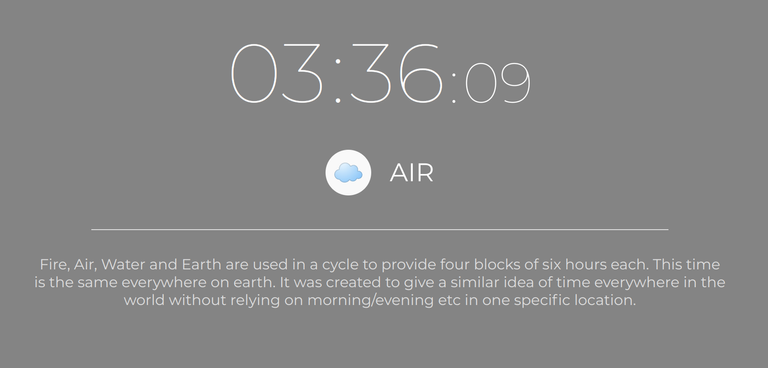Hello everyone!
For the last time I have been sharing with my friends a new system that I thought out. It's a system of universal time telling, and I want to use this article to explain it to you. You can see the current time according to my system at https://etime.neocities.org and the code for it can be found at https://github.com/lapingvino/etime. etime is short for elementary time, and you will understand why soon enough.
Now the first thing you might say, as a programmer for example, is that we already have universal time. It's UTC. And that works fine as a programmer, but it's absolutely horrible for use by people. The fact that it works just fine for a computer shows that this is not something about if it's useful enough for just telling the time, I think it's really the best thing we have for computer time telling, but for human interaction it doesn't get us away from converting to our local time zones.
Why is this? Well, when we use our local time zone, we don't actually use the numbers all that much. We use a set of reference points: day and night, morning and evening. The problem when we start using UTC is not that it would be inadequate as a time telling device, but that we lack these reference points. It doesn't feel right to use UTC midnight at the middle of the day on the other side of the world.
This is also for example why .beats, introduced by Swatch, but heavily protected, not only didn't really catch on, but is unlikely to work well for how humans work.
So my system doesn't really introduce a new time system. Instead it provides a new way of using UTC for worldwide human consumption. As such it's really easy to implement on a UTC-based system, and indeed some of my friends have already done this. I much prefer to show people https://tenpopona.neocities.org which I didn't create myself, but is much prettier.
So what did I do? Nothing more than dividing the UTC day into 4 sectors of 6 hours, and labeling them with the 4 elements going from 0:00 UTC in the order Fire, Air, Water, Earth. What this actually does is providing us a new global reference for time telling. The four elements provide us a similar reference globally on the internet as morning, noon, evening and midnight do with local time, but with the difference that it's the same for everyone. You can do very precise time telling with this system, and it's dead simple to convert to and from it in relation to UTC or your local time, but it also feels natural for everyone on earth, because you quickly start to realize that the elements are always on the same part of the day. For example I always should be asleep at "fire".
This makes it really easy to use them to talk about when for example to plan a meeting, because you know what you do at which part of the day. You don't have to calculate from always a different time zone. Now you will notice that there is also a weird extension called "quarterday". This should usually not be necessary, but can be useful for planning meetings over several days to sidestep the issue of the different local day transitions, to be sure you talk about the same moment. A quarterday matches exactly a block of 6 hours, an element.
(Also just as a suggestion, I talked with a friend about using the elements for greetings, so there using the convention to say an hour o'element (for example 3:31 o'air) can be useful, and then to greet someone with Good o'air! In many other languages this shouldn't even be necessary, because greetings are easier to distinguish.)
I will be very glad to hear about your experience using this world time system!

The nicer of the websites, https://tenpopona.neocities.org, using the system. Not mine, my work isn't so pretty.
Interesting! The four natural elements referring to time might put people off, though... In my humble opinion. But this could easily be Morning, Day, Evening, Night!
the elements are chosen with a reason: 1. they are international 2. they don't have a link to visible time. point 2 is important, because it is the same everywhere on earth. just everyone links it to a different part of the day where they are.
Good points. I will consider this further.
A great idea!